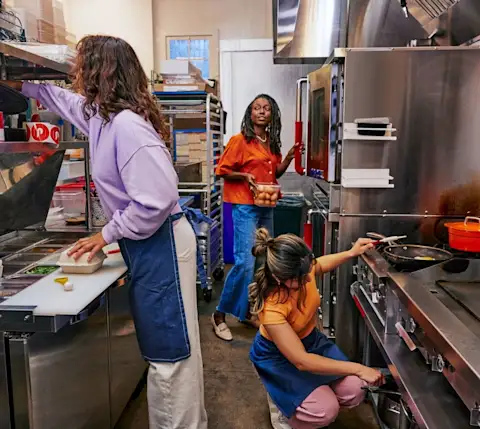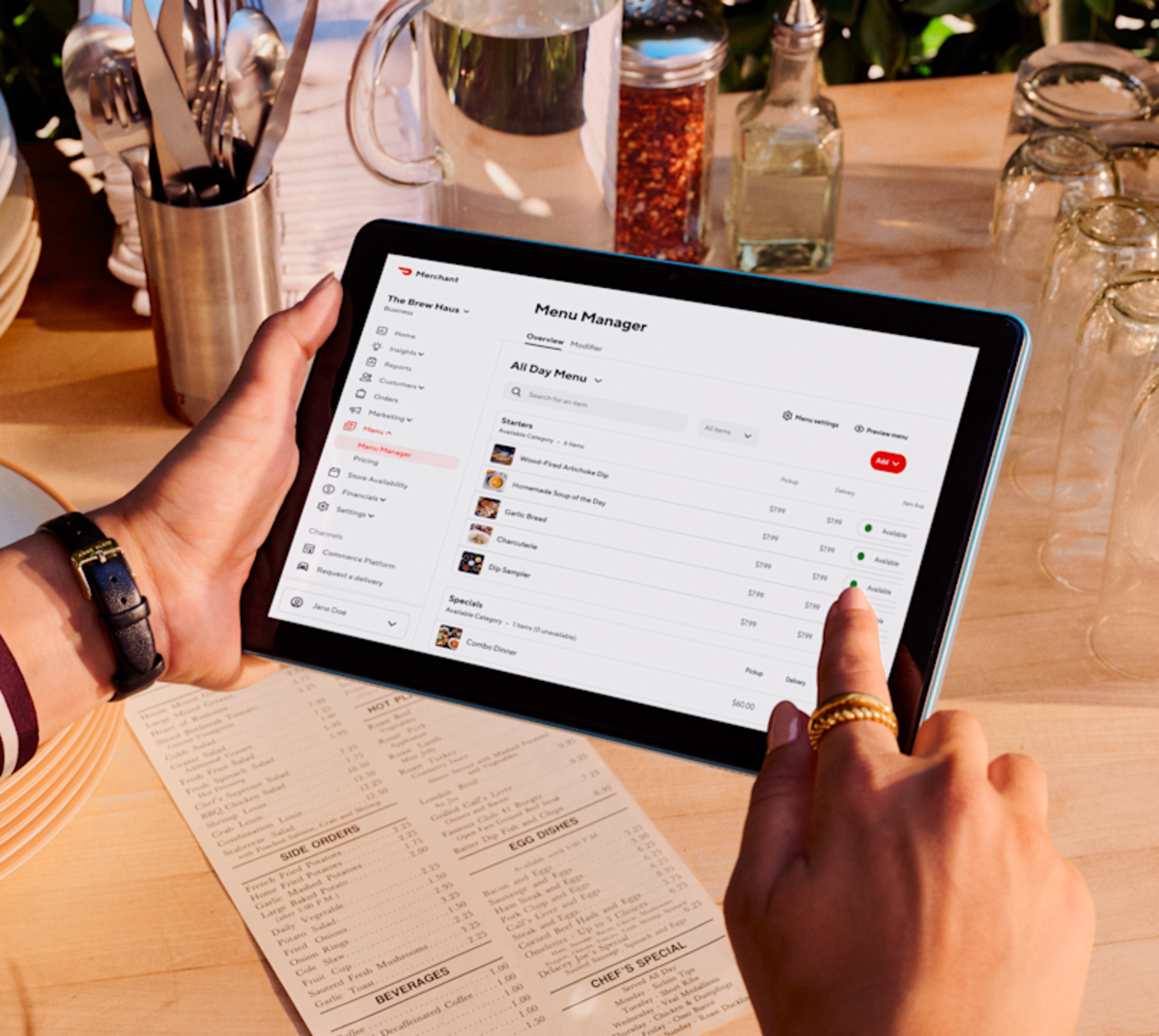Turnover is practically a rite of passage in the restaurant industry. But when it comes to your manager, you want someone who brings order to the chaos, keeps the team on track, and helps create the kind of workplace people actually want to stick around for.
The first step to finding that cream-of-the-crop leader? A well-written restaurant manager job description.
Here's how to craft a front of house job description that stands out, sets clear expectations, and helps your business attract the right fit for your restaurant.
Why a clear restaurant manager job description matters
Managing a restaurant is about much more than making the schedule and keeping an eye on the floor. A great restaurant manager wears several hats — coaching staff, handling guest concerns, keeping operations in check, and ensuring everything runs smoothly behind the scenes. They're also key to creating a positive workplace culture and delivering the kind of experience that keeps guests coming back.
Because the role is so dynamic, writing a clear, well-rounded restaurant job description that captures the full scope of what's expected is essential. That way, you can set expectations from day one, making it easier to attract the right person and support their long-term success.
What an example restaurant manager job description looks like
It's simple math: a well-crafted job description attracts the right candidates. For a pivotal restaurant manager role, it's important to be specific about what you're looking for — from leadership experience to people skills — while showcasing what makes your restaurant a great place to work. Here's how you might structure a restaurant manager job description:
Job Title: Restaurant Manager
Location: [Restaurant name], [City, State]
Pay: Include the salary range and whether bonuses or other incentives are a part of the compensation package.
Schedule: Specify whether the position is full-time (40 hours per week) or part-time (20 hours per week), along with expected shifts or availability.
Restaurant Overview: Give a brief overview of your restaurant — what kind of food you serve, the style of service, and the culture or environment you're building. This is also where to describe the kind of leader you're seeking: someone who's organized, calm under pressure, and passionate about hospitality.
Roles and Responsibilities: Clearly outline the restaurant manager's duties in greater detail. Some responsibilities might include:
Oversee day-to-day front- and back-of-house operations
Lead, train, and support staff to maintain high service standards
Create and manage weekly staff schedules
Monitor inventory levels and coordinate with suppliers
Handle guest feedback and resolve issues professionally
Ensure compliance with food safety and labor regulations
Collaborate with ownership or senior leadership on restaurant goals and initiatives
Track and analyze key performance metrics (sales, labor costs, etc.)
Help create a positive, inclusive, and efficient work environment
What We're Looking For:
5+ years of experience in restaurant management or a similar leadership role
Strong interpersonal and team-building skills
Ability to multitask and problem-solve in a fast-paced setting
Familiarity with POS systems and basic business reporting
Excellent communication and organizational skills
Availability to work evenings, weekends, and holidays as needed
Perks & Benefits:
Competitive salary and performance-based bonuses
Health insurance or wellness benefits
Flexible scheduling or paid time off
Opportunities for advancement and professional development
Staff meals or discounts
Supportive and inclusive workplace culture

Key elements of an effective restaurant manager job description
A restaurant job description for managers should cover three core areas to be effective. First, it should tell applicants exactly what type of establishment you run, which adds context and nuance to what you're looking for in a manager. Second, it should detail the roles and responsibilities that the manager is accountable for. And third, it should list any prior requirements, certifications, or training necessary.
1. The type of restaurant or bar you operate
Start your front of house job description with a clear picture of your restaurant, its people, and the type of manager you're looking for.
Whether you're a fast-paced, family-friendly diner or a cozy neighborhood cafe, each setting calls for a different style of management and leadership. The more context you provide, the better chance you have at finding the perfect fit.
2. The work schedule
Be upfront about what kind of schedule you're hiring for. Is this a full-time position with evening and weekend shifts? A salaried role with flexible hours? Restaurant managers often work long and varied hours, so clarity here helps set expectations from the start.
3. The specific duties of management
Lay out day-to-day expectations clearly. And beyond hard skills like risk management and budgeting, highlight soft skills that matter too. Communication, adaptability, and the ability to stay cool under pressure are just as important as any technical know-hows.
4. The prerequisite job requirements
Not all restaurants have requirements that applicants must meet for consideration — but if you do, mention them. These might include familiarity with scheduling software or POS systems, food safety certifications, or a track record of successfully managing teams. If you're open to training someone with potential, you can say so too.
5. The perks and benefits you offer
An appealing restaurant job description doesn't just outline what candidates need — it also showcases what you offer. Whether it's competitive pay, flexible scheduling, staff meals, or professional development opportunities, this is your chance to pitch why joining your team is more than a job — it's a valuable career opportunity.
What to look for in restaurant manager resumes
Some candidates stand out right away. They understand what it takes to lead a team and keep a restaurant running smoothly — and they highlight these qualities front and center on their resume.
Make note of applicants who have experience managing in fast-paced environments, especially those who mention leadership, team-building, or crisis management. Strong candidates will highlight moments where they solved problems under pressure, improved operations, or helped boost team morale.
Previous restaurant management experience is always a plus, as is familiarity with scheduling, inventory systems, and guest service protocols. But keep in mind: not every great leader comes with the "perfect" resume. Someone less experienced with equal parts potential and passion might still be the right fit.
There are a few non-negotiables, though. Restaurant managers need to be organized, dependable, and skilled multitaskers. They're the bridge between ownership and staff, and between the front and back of house, so they must be able to communicate clearly, manage time effectively, and maintain a calm, solutions-oriented mindset. Bonus points if their resume shows a real commitment to hospitality — a telltale sign of someone who can provide long-term value for your team and guests.

How a strong job description boosts retention and performance
Most restaurateurs will agree that turnover is one of their businesses' top challenges. Constantly having to cover and hire for vacant positions is costly both in terms of time and money. That's certainly the case for Mike Solomonov, whose CookNSolo restaurant group oversees many successful ventures and venues across Philadelphia.
His solution? Recruiting talent who want opportunities to advance in the company. By having a detailed job description, Mike attracts applicants who have a passion for food and customer service, which bodes well for their performance and longevity.
"We look at revenue, we look at sales, but really, we look at the way to position our employees and upward mobility for them. And that's what determines our growth."
At the end of the day, a restaurant manager job description is a chance to differentiate your business as a brand that people want to work for. So be sure to highlight the professional development opportunities you offer or the culture of engagement and empowerment you've built.
And if you're hiring for other restaurant roles: check out our guides to hiring the perfect server and bartender.



